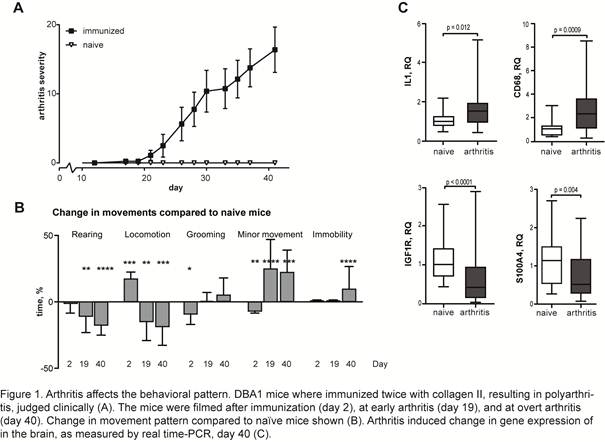Session Information
Session Type: ACR Poster Session C
Session Time: 9:00AM-11:00AM
Background/Purpose: Rheumatoid arthritis (RA) is an autoimmune disorder characterized
by joint inflammation and destruction. Pain is the major symptom in RA, which often
persists despite resolution of inflammation. This indicates a deregulation of central
nervous system processing of pain in RA, but the underlying mechanisms remain
largely unexplored.
The aim of this study was to examine whether
joint inflammation was associated with changes in the brain. Expression of
genes involved in inflammation and neuroprotection was studied.
Methods: Arthritis was induced in DBA/1 mice by immunization with collagen
type II. Development of arthritis and behavioral pattern of each mouse were
followed clinically by regular assessment and filming. Behavioral pattern
including locomotion, rearing, grooming, minor movements, and immobility, was
compared to that of naïve healthy siblings, recorded simultaneously.
Quantification of gene expression by RT-PCR was performed in cerebellum,
medulla, basal ganglia and motor cortex.
Results: Arthritis decreased locomotion and rearing, and increased periods
of minor movements. These changes were apparent already in early arthritis, and
increased with the arthritis severity. The brain of arthritic mice showed increased
expression of inflammatory cytokine IL-1, which correlated with duration of
minor movements. mRNA levels of CD68, a marker of activated microglia, were
increased, predominantly in the motor cortex. The expression of IGF1R and
S100A4, known to be important for neuroprotection and regeneration, was down-regulated
with arthritis. The alterations in gene expression correlated with changes of
behavior of the arthritic mice.
Conclusion: Arthritis changes the behavior of mice potentially by altering gene
expression in the brain. The expression of inflammatory and microglia
activation marker genes were increased, and the expression of neuroprotective genes
was decreased, resembling the situation in neurons during Alzheimer’s disease.
To cite this abstract in AMA style:
Andersson KM, Leifsdottir L, Erlandsson M, Pekna M, Pekny M, Olmarker K, Bokarewa M. Rheumatoid Arthritis Leads to Altered Gene Expression in the Brain and Behavioral Changes in Mice [abstract]. Arthritis Rheumatol. 2015; 67 (suppl 10). https://acrabstracts.org/abstract/rheumatoid-arthritis-leads-to-altered-gene-expression-in-the-brain-and-behavioral-changes-in-mice/. Accessed .« Back to 2015 ACR/ARHP Annual Meeting
ACR Meeting Abstracts - https://acrabstracts.org/abstract/rheumatoid-arthritis-leads-to-altered-gene-expression-in-the-brain-and-behavioral-changes-in-mice/

